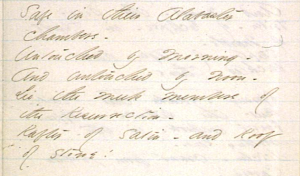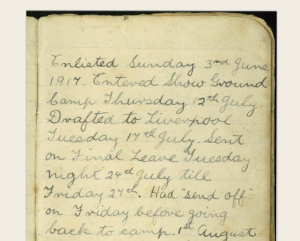Whenever I teach Emily Dickinson’s poetry I tell the story of how, shortly before she died, Dickinson instructed her sister Lavinia to burn her private papers after her death. Yet, when Lavinia found a chest full of handwritten poems in Emily’s bedroom, she made the radical (for the time) decision to reject her sister’s instruction and she did not burn the poems. Basically, we have Lavinia to thank for the fact that Emily Dickinson’s poems are available to us.

Dickinson’s “Safe in their Alabaster Chambers,” manuscript version
When I tell this story, my students often gasp in horror at the thought of how close Dickinson’s poems came to being lost to us forever.
But when I ask my students – often the same ones who have poured over Dickinson’s manuscripts with awe and incredible care – about their own personal papers, they frequently say they don’t want their own writing to be preserved. Many of them talk about burning or destroying – or having someone else destroy – their diaries, journals, notebooks, letters, and so forth. (In my experience, they are pretty blasé about outliving their electronic records – blogs, emails, Facebook accounts – because they believe them to be inherently ephemeral due to digital obsolesence.)
I ask my students: But what if you are the next Emily Dickinson? She didn’t know she was a towering figure in American literary history. She didn’t know that people would devote their lives to the study of her poems. How do you know your writing isn’t valuable to the next generation or for generations to come?
Although Dickinson was a poet, the story of how close her poems came to being destroyed has, in my opinion, a parallel to the question that every diarist faces: What will happen to your diaries upon the event of your death?
Please, whatever you do: Don’t destroy your diaries, or plan to have someone else do so!
Here’s my case for why you should preserve, protect, and cherish your diaries, journals, or other personal writing.
° Save them for your family or descendants. You never know why your writing may be important in the future, or what kind of lasting impact your writing might have – and this is particularly true for people who have a familial or genealogical link to you. How would you feel if you came upon a diary kept by a great-grandparent, for example? I suspect you would find it fascinating and meaningful, and maybe especially because of what it tells you about your heritage. Think of all the questions you have about your ancestors, and what you could learn by even a partial glimpse of their personal lives. Someday someone will have similar questions about you. Leaving your diaries is one way of extending a hand to a future generation that you cannot even conceive of, and may never know directly. What an amazing gift!
° Save them for posterity. I am a scholar who spends my days pouring over historical materials in dusty archives so I am acutely aware of how much of what we know about our history is based on what gets saved – and what doesn’t. What gets saved gets studied and incorporated into scholarly knowledge. What gets lost or destroyed leaves a gap in the historical record that can be irrecoverable – and that can result in distorted or incomplete understandings of the past. This is particularly true of writing by or about “ordinary” people. Famous or important people usually have their papers saved (it’s one of the perks of fame and social significance). Ordinary people are the ones whose lives go undocumented. Historians and literary critics are acutely aware of this issue and actively seek out and revere the life stories of ordinary people because they provide a corrective, an invaluable insight that re-balances our perspective on the past. So, even if you think you aren’t historically significant, your diary may end up being exactly that.

E.S. “Gordon” Lacey Diary 1917
° Save it because you just never know. Okay, I’m going to get existential here. My first two points imagine a specific future reader: a descendant or a scholar. But, I think it’s possible that there are future uses of your diary that neither you nor I can imagine. Who knows what the future holds? On particularly dark days, I think about all the threats to survival on this planet and I wonder what will end up being the last surviving evidence of human culture on Earth. Maybe some alien life in a very distant future will pour over your diary and learn something of what it was like to be a human living now, in this time and place. And maybe that will be significant in ways that far exceed our understanding.
Right now, you’re either thinking of all the reasons why you should still not save your diaries – in which case, you should read Part 2: “But my diary is silly or shameful. Common arguments for destroying personal writing, and why they are unconvincing.”
Or, you are thinking, “Okay! I’m on board. But … how? What do I do next?” In which case, you should read Part 3: “How to Make Sure Your Diary Doesn’t End Up in the Trash.”
Pingback: But my diary is silly or shameful. Common arguments for destroying personal writing, and why they are unconvincing. | The Diary Index
Pingback: How to Make Sure Your Diaries Don’t End Up in the Trash | The Diary Index